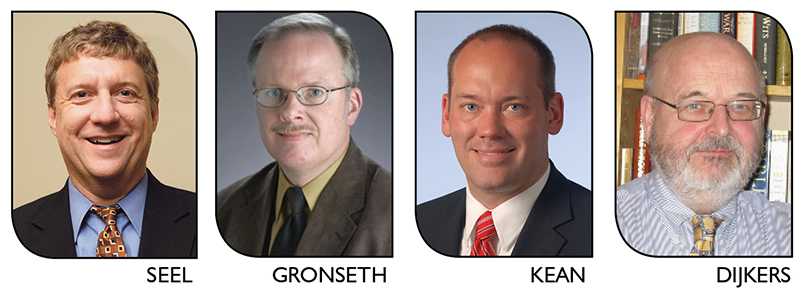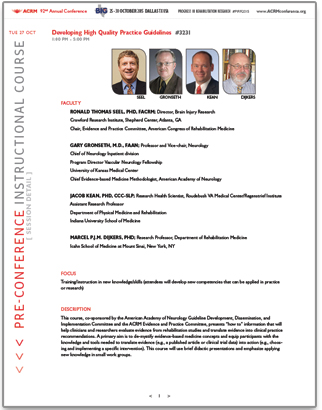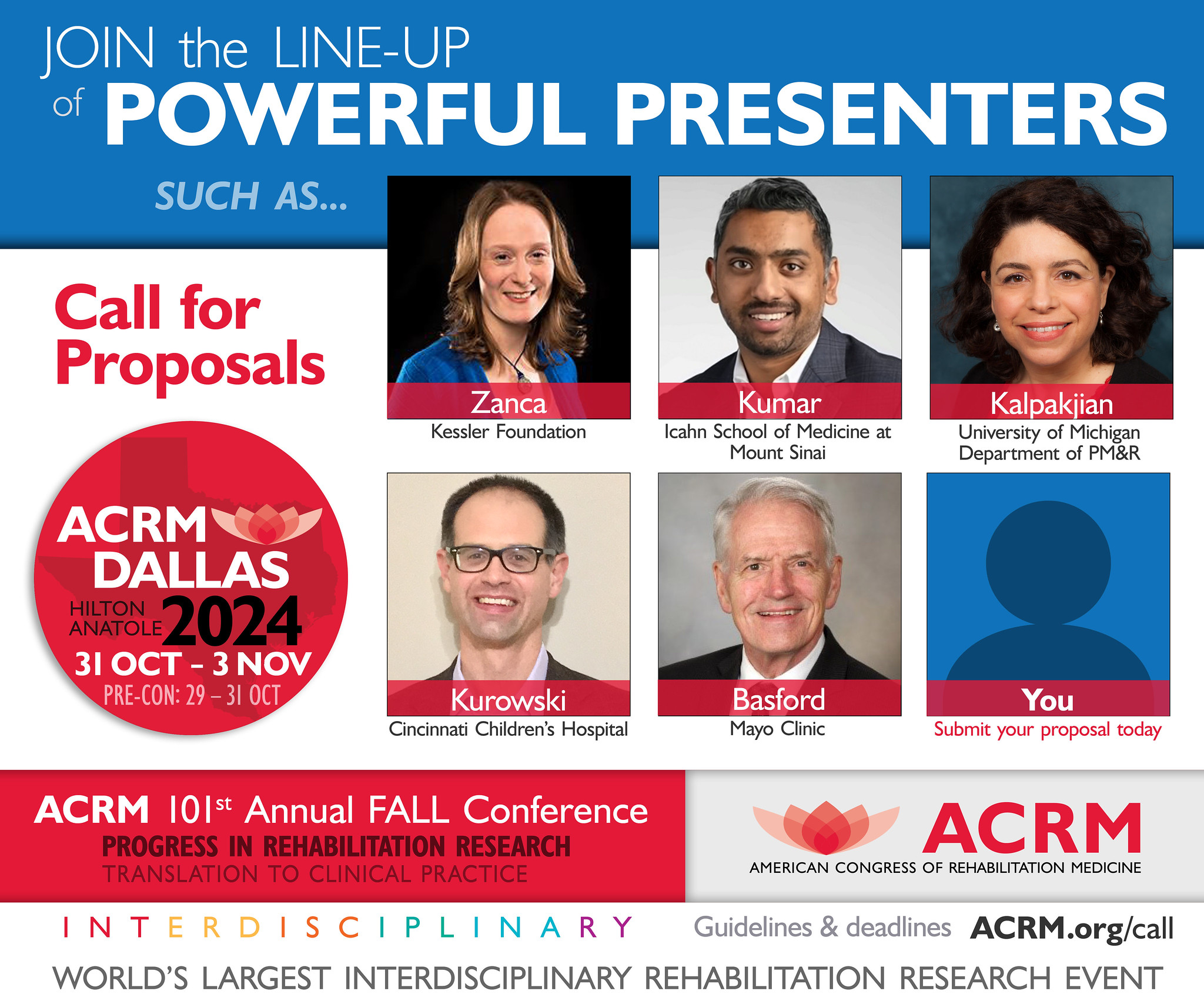INSTRUCTIONAL COURSE DETAIL
TUES 27 OCT: 1:00 PM – 5:00 PM

Ronald T. Seel, PhD, FACRM; Gary Gronseth, M.D., FAAN; Jacob Kean, PhD, CCC-SLP; Marcel P.J.M. Dijkers, PhD
>>> SEE / DOWNLOAD & SHARE FLYER PDF
SPEAKERS
Ronald T. Seel, PhD, FACRM; Director, Brain Injury Research; Crawford Research Institute, Shepherd Center, Atlanta, GA; Chair, Evidence and Practice Committee, American Congress of Rehabilitation Medicine
Gary Gronseth, M.D., FAAN; Professor and Vice-chair, Neurology; Chief of Neurology Inpatient division; Program Director Vascular Neurology Fellowship; University of Kansas Medical Center; Chief Evidence-based Medicine Methodologist, American Academy of Neurology
Jacob Kean, PhD, CCC-SLP; Research Health Scientist, Roudebush VA Medical Center/Regenstrief Institute; Assistant Research Professor; Department of Physical Medicine and Rehabilitation; Indiana University School of Medicine
Marcel P.J.M. Dijkers, PhD; Research Professor, Department of Rehabilitation Medicine, Icahn School of Medicine at Mount Sinai, New York, NY
FOCUS
Training/instruction in new knowledge/skills (attendees will develop new competencies that can be applied in practice or research)
DESCRIPTION
This course, co-sponsored by the American Academy of Neurology Guideline Development, Dissemination, and Implementation Committee and the ACRM Evidence and Practice Committee, presents “how to” information that will help clinicians and researchers evaluate evidence from rehabilitation studies and translate evidence into clinical practice recommendations. A primary aim is to de-mystify evidence-based medicine concepts and equip participants with the knowledge and tools needed to translate evidence (e.g., a published article or clinical trial data) into action (e.g., choosing and implementing a specific intervention). This course will use brief didactic presentations and emphasize applying new knowledge in small work groups.
ABSTRACT BODY
This 4-hour instructional course, “Developing High Quality Practice Guidelines“, addresses a critical issue for the rehabilitation field—how to systematically review research evidence and develop practice guidelines that have the potential to improve patients’ quality of care and outcomes. This course is co-sponsored by the American Academy of Neurology Guideline Development, Dissemination, and Implementation Committee and the ACRM Evidence and Practice Committee. The primary focus of this course is to present “how to” information that will help clinicians and researchers to evaluate rehabilitation studies and synthesize this into evidence for clinical practice, including the development of practice guidelines. We will address core issues and methodological considerations when evaluating rehabilitation interventions, and translating evidence into clinical decisions or recommendations. A primary aim of this course is to de-mystify evidence-based medicine (EBM) concepts and equip participants with the knowledge and tools needed to translate evidence (e.g., a published article, a research presentation, or clinical trial data) into action (e.g., choosing and recommending/implementing a specific intervention).
This instructional course will minimize traditional didactic presentations. Instead, participants will primarily work in small groups on exercises that apply new knowledge and problem-solving to real world evaluations and translation of research evidence using a peer instruction model. The course will consist of a series of short didactic presentations each followed by a small group exercise. Each participant will be assigned to a small group, which will be led by a course faculty member with expertise in EBM. Each faculty-mentored group will complete exercises illustrating specific steps in the EBM(/Systematic Review/Guideline Development) process including: (a) formulating evidence-answerable questions; (b) efficiently searching the literature to find high quality evidence; (c) assessing studies’ risk of bias; (d) interpreting studies’ results for significant and clinically meaningful effects; (e) synthesizing the results of multiple studies; and, (f) using evidence along with other considerations to make patient-centered decisions.
To illustrate EBM concepts participants will review the research evidence pertinent to a current intervention topic, which will be taken from a practice guideline currently being developed by ACRM members. The results of the course participants’ deliberations will inform the final practice guideline. The contributions of the participants to the guideline’s development will be acknowledged in an appendix accompanying the published guideline. Although participants will learn EBM processes that are specific to the development of a practice guideline using the AAN guideline development process, the concepts that will be reviewed will be applicable to everyday clinical practice. Participants should come to the course with a laptop computer with the ability to connect to the internet wirelessly. Wireless internet access will be provided throughout the course. The laptop should also have a USB port.
LEARNING OBJECTIVES
-
Understand the principles of EBM, systematic review of evidence, and how these apply to the everyday practice of rehabilitation
-
Analyze published articles that address therapeutic questions, assessing their accuracy and scientific rigor
-
Synthesize the evidence from available studies with a focus on low-bias properly statistically analyzed research
-
Make appropriate evidence-based clinical decisions on the selection of treatments based on evaluated research
-
Reduce making clinical decisions based on studies with very high bias and/or misuse of statistical procedures
BIO SKETCHES
Ronald T. Seel, PhD, FACRM
Ronald T. Seel, PhD, FACRM, is Director of Brain Injury Research for the Crawford Research Institute at Shepherd Center. He is a Fellow of the American Congress of Rehabilitation Medicine (ACRM) and is the recipient of the ACRM Deborah L. Wilkerson Early Career Award (2010) and the ACRM Distinguished Member Award (2012). Dr. Seel currently serves as an At-Large Member on the ACRM Board of Governors, and chairs the ACRM Evidence and Practice Committee, Awards Committee, and the Brain Injury-Interdisciplinary Special Interest Group mild TBI task force. He serves on the editorial board of the Journal of Head Trauma Rehabilitation. Dr. Seel has over 50 peer-reviewed publications in the areas of brain injury, spinal cord injury, research methodology, and outcomes measurement. He was lead editor on the Archives of Physical Medicine and Rehabilitation research education supplement, “Developing and using evidence to improve rehabilitation practice.” Dr. Seel graduated from the College of William and Mary in Williamsburg, VA and completed his MS and PhD in Counseling Psychology at Virginia Commonwealth University (VCU). He was competitively awarded pre- and post-doctoral research fellowships in Rehabilitation and Clinical Neuropsychology at the Medical College of Virginia.
Gary S. Gronseth, MD, FAAN
Gary S. Gronseth, MD, FAAN earned his undergraduate degree at Marquette University in 1977. He graduated in 1981 with a degree in medicine from the Medical College of Wisconsin, and completed his internship at St. Joseph’s Hospital in Milwaukee in 1982. Dr. Gronseth finished flight surgeon education at the School of Aerospace Medicine at Brooks Air Force Base in San Antonio and subsequently served as Chief of Aerospace Medicine at Malstrom Air Force Base in Montana. In 1989, he completed his Neurology residency at Wilford Hall Air Force Base in San Antonio. From 1996 to 2002, he was Chairman of Neurology and Director of the Neurology residency program at Wilford Hall Air Force Base. In 2002 Dr. Gronseth retired from the Air Force with the rank of Colonel. Dr. Gronseth’s career at the University of Kansas Medical Center began in 2002, where he currently serves as Professor and Vice Chair of the Department of Neurology. He is also the Program Director of the Vascular Neurology Fellowship and Chief of the Inpatient Neurology division. Dr. Gronseth also serves as the American Academy of Neurology’s Chief Evidence-based Medicine Methodologist and is an Associate editor of the journal Neurology. Dr. Gronseth has authored over 50 AAN Clinical Practice Guidelines.
Jacob Kean, PhD
Jacob Kean, PhD, is a Core Investigator of the VA HSR&D Center for Health Information and Communication at the Richard L. Roudebush VA Medical Center, Indianapolis, Indiana, an Assistant Research Professor in the Department of Physical Medicine and Rehabilitation at Indiana University School of Medicine, and a Research Scientist at the Regenstrief Institute and IU Center for Health Services and Outcomes Research. Dr. Kean’s research focuses on the development and refinement of clinical and outcome measures and the implementation of evidence-based practices in real-world practice settings. He is a member of ACRM’s Evidence and Practice Committee, which is responsible for reviewing rehabilitation-relevant clinical practice guidelines, and a member of ACRM’s Brain Injury – Interdisciplinary Special Interest Group panels on Disorders of Consciousness, Outcomes Measurement, and Military/Veterans Issues. Dr. Kean is the recipient of a VA Rehabilitation Research and Development Career Development Award focused on the development of measurement-based telehealth care for mild traumatic brain injury. His past and current projects include the evaluation of the clinical performance of PROMIS pain and depression measures and the refinement of measures of brain injury recovery and outcome.
Marcel P. Dijkers, PhD, FACRM
Marcel P. Dijkers, PhD, FACRM, is Research Professor, Department of Rehabilitation Medicine of the Icahn School of Medicine at Mount Sinai in New York, NY. His rehabilitation research on a number of diagnostic groups (with focus on spinal cord injury and traumatic brain injury) has led to a special interest in research methodologies and the reporting of research, as well as the analysis and synthesis of reported research for practical decision making. He is a member of ACRM’s Evidence and Practice Committee, and has served as the methodologist for a number of guideline development efforts. The recipient of the ACRM Distinguished Member and Gold Key awards, he has published a number of papers on evidence-based practice and the methodologies supporting it.
One full day of Instructional Courses $195 Three full days $395
WORLD PASS (from $595) is the best value if you attend just one instructional course and the CORE Conference. Pricing detail CLICK HERE![]()
*Although significant changes are not anticipated, all schedules, sessions, and presenters posted on this website are subject to change.









